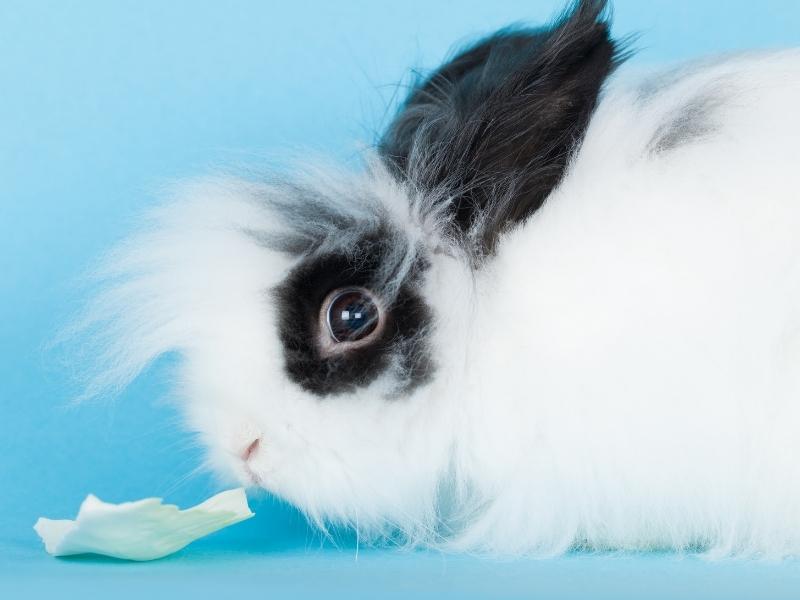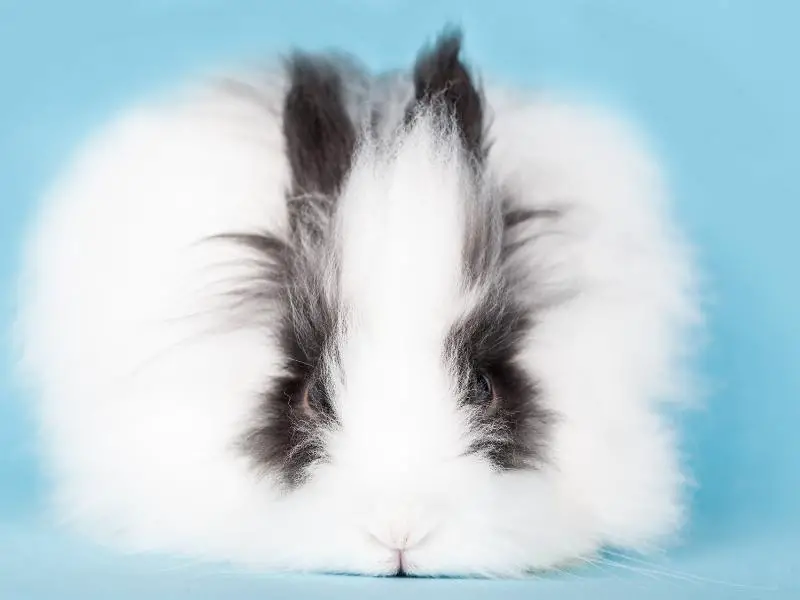Ah, rabbits—they’re cute and cuddly but not quite like dogs and cats.
If you’re thinking of having one as a pet, perhaps you’d like to know more about the Jersey wooly rabbit, also known as the no-kick bunny.
A Jersey wooly is a domesticated rabbit breed that’s also one of the gentlest and most non-aggressive breeds out there. It is what earned them the nickname no-kick bunny. Because of this, they make great pets for children and people of all ages.
What Is a Jersey Wooly Rabbit?
Weighing at around two to three pounds when fully matured, the Jersey wooly is a breed of rabbit with small ears and a compact body.
Their heads are squarish and bold, which is also why some call them Mug heads.
Jersey wooly rabbits are usually bred as pets, and you’d frequently see them in rabbit shows all over the country.
There’s no doubt you’ll love them for their noteworthy wool fur that comes in a variety of colors.
Jersey Wooly Rabbit History and Origin
In 1988, the American Rabbit Breeders Association or ARBA gave the first-ever official recognition to the Jersey wooly rabbit breed.
A New Jersey-based rabbit breeder named Bonnie Seeley crossed the Netherland Dwarf rabbit and the French Angora rabbit.
She introduced the small rabbit to the ARBA in 1984, which resulted in the Jersey wooly’s admission to the list of rabbit breeds four years later.
In its earlier years, the Jersey wooly rabbit had an oblong body because of the French Angora rabbit’s genes.
However, continuous breeding led to their now petite appearance as the Netherland Dwarf’s genes significantly affected its evolution.
Jersey Wooly Rabbit Characteristics

Scientifically known as Oryctolagus cuniculus, the Jersey wooly rabbit is a dwarf breed with short to medium fur.
If you ever plan to take care of one, here are some of the most important characteristics you need to know about it.
Temperament
You’re in for a stress-free life if you decide to take care of a Jersey wooly rabbit because they show little to no signs of aggression.
Their gentle nature and leveled temper make them great family pets, even for first-timers.
You may still need to supervise your children when approaching or handling this breed, though.
However, you don’t have to worry too much because Jersey wooly rabbits are very affectionate and quiet.
Potty Training
Rabbits are generally harder to potty train than dogs or cats. That’s just a natural downside that comes with being a rabbit fur-parent.
That said, you can train your Jersey wooly rabbit to do its business in the appropriate location by placing a litter box in a specific corner of its enclosure.
Color Varieties
A Jersey wooly rabbit’s smooth fur is further adorned by its varying colors. In fact, this breed has one of the largest color groups in rabbits.
Some Jersey woolies come in solid or broken black, chestnut, blue, lilac, or white.
Furthermore, white-furred Jersey woolies have two varieties. You can see them having either blue or red eyes.
Health
One of the most common health problems among rabbits is a wool block, the buildup of fur in the animal’s digestive tract caused by ingestion.
Wool block often occurs in breeds that shed heavily or grow significantly long fur.
The Jersey wooly rabbit has short fur, reducing the risk of wool block. However, they’re still not entirely out of the woods yet.
Rabbits often clean themselves by licking their fur. Sometimes, this causes them to ingest a heavy amount of hair that might cause a wool block.
You can prevent this from happening by following the care tips we’ll talk about later.
Lifespan
Multiple factors may affect the shortness or longevity of your Jersey wooly rabbit’s lifespan. This can include genetic structure at birth, maintenance, and care.
Nonetheless, the average lifespan of a Jersey wooly rabbit is between seven and 10 years.
Some pet owners claim that when spayed, a Jersey wooly rabbit’s lifespan may extend for a couple or more years.
However, there is no scientific proof of this, so it’s your call whether to neuter your Jersey wooly rabbit or not.
Nonetheless, we still should mention that neutering your Jersey wooly might be a good idea.
By doing so, you can significantly reduce your rabbit’s risks of developing life-threatening tumors or cancer.
Jersey Wooly Rabbit Care
Jersey woolies are one of the lowest-maintenance rabbit breeds out there.
Even so, you still need to ensure that they get the proper care they need.
Aside from being affectionate with them, here are other things you need to consider:
Spaying/Neutering
Spaying or neutering your Jersey wooly ultimately depends on you.
However, if your rabbit tends to mark its territory by urinating in different parts of your home, spaying or neutering could help prevent it.
If you decide to spay or neuter your Jersey wooly, be sure to bring it to the vet at around four to six months.
Coat Care
Because of its size, coat care and maintenance are relatively simple. You don’t need to trim or clip its wool as they don’t grow very long.
Nonetheless, be sure to brush your Jersey wooly’s coat at least once every seven days to keep the fur from tangling. Doing so will also help keep it clean.
During your Jersey wooly’s shedding seasons, which is around spring, increase your frequency of brushing its coat to twice or thrice a week.
If your Jersey wooly’s coat got dirty, grab a clean piece of cloth and damp it with water. Rub the dirty spot until it’s clean.
Do not give your Jersey wooly a full bath, as this can cause a tremendous amount of stress leading to cardiovascular problems.
Exercise and Play
While the Jersey wooly is gentle and docile, it is also playful and curious.
They love going around the house and meeting guests and visitors. That’s why interaction with your Jersey wooly is essential.
Make sure that you play with them and encourage your guests to do the same.
Aside from affectionate interaction, Jersey woolies also love chewing.
It’s vital that they have something to chew on whenever they like. Otherwise, your precious belongings might be at risk.
Housing and Environment
Compared to other rabbit breeds, the Jersey wooly is relatively small.
They’re only about one to two feet small, making them prone to outdoor threats such as predators and extreme temperatures.
That said, make sure that you keep your Jersey wooly indoors.
Don’t worry; with their small size, we’re sure there will be plenty of room for them to play in.
On the other hand, keep an eye on your Jersey wooly if you ever want to bring them outdoors.
Never let them out of your sight as snakes, raccoons, foxes, or even cats can cause them serious injury.
Diet
Jersey wooly rabbits love pellets, leafy greens, fruits, and hay. The latter should comprise about 80 percent of your Jersey wooly’s diet.
Your rabbit’s diet should be rich in fiber and essential nutrients to keep its metabolism functioning properly.
Furthermore, chewing on hay also helps improve your Jersey wooly rabbit’s dental health.
If you ever wish to feed them fruits or vegetables, limit it to three or four times a week.
Give them only one tablespoon for each feeding to accommodate the breed’s relatively small size.
Feeding them frequently in large amounts can cause numerous health problems.
Breeding Jersey Wooly Rabbit
Some rabbits are bred as family pets, while others provide rabbit breeders with wool or meat to sell or use personally.
When it comes to Jersey woolies, here’s what you need to know about their breeding practices:
As Pets
The most common and perhaps the only reason why people breed Jersey woolies is to domesticate them.
Since they don’t bite or kick, their temperament and behavior are the ideal characteristics you’d want in pet rabbits.
For Wool
Jersey Woolies don’t shed very often. The length of their fur is also not as long as other rabbits.
For this reason, they don’t do well when bred for wool because you won’t be able to generate a profit out of them.
For Meat
If you ever want to breed Jersey woolies for meat, we’re here to tell you that you’d be disappointed.
Its small size doesn’t really provide rabbit-breeders with a lot of meat.
For pretty much the same reason as above, they also don’t do great when bred for meat.
Jersey Wooly Rabbit Price
Jersey woolies cost around the same price as the average pet rabbit, which is about 20 to 50 dollars.
Of course, this depends on the health, appearance, and quality of the rabbit.
If you’re only looking to take care of a Jersey wooly at home, your 50 dollars will go a long way.
On the other hand, Jersey woolies that are of show quality can reach prices of up to 100 dollars.
Some may even sell for a couple of hundred dollars or more.
Conclusion
Families who want a new pet in their home should look no further than the Jersey wooly rabbit.
Thanks to their temperament, cute appearance, and low-maintenance needs, they make great pets for people of all ages.
Even better, they don’t cost a ridiculous amount as dogs and cats do.
Related Articles:

